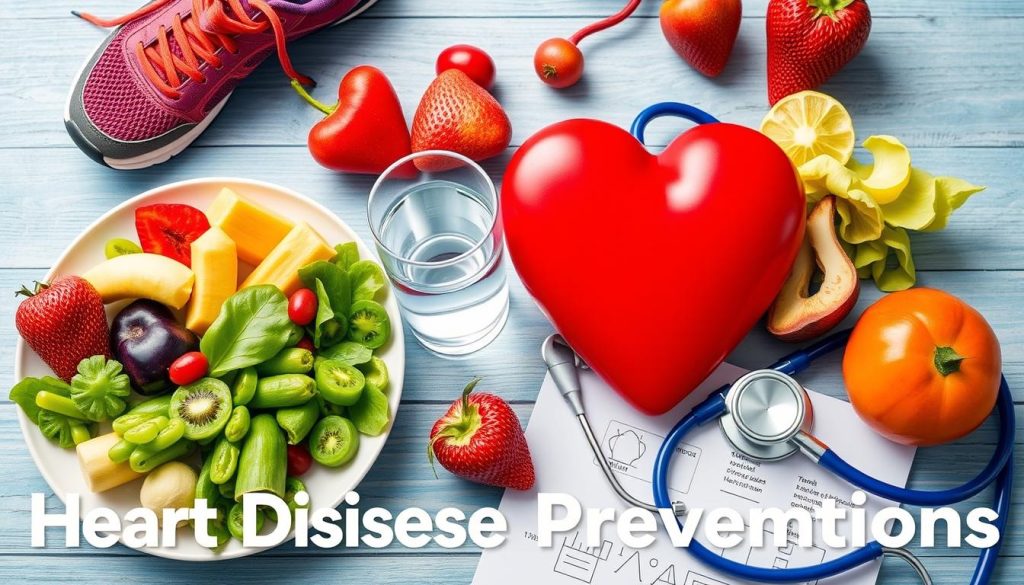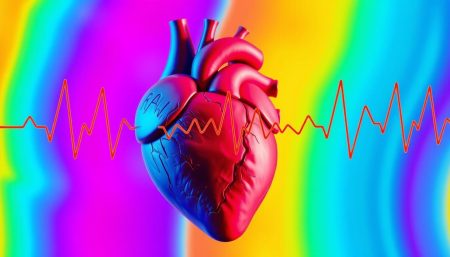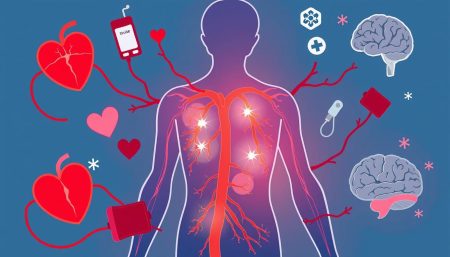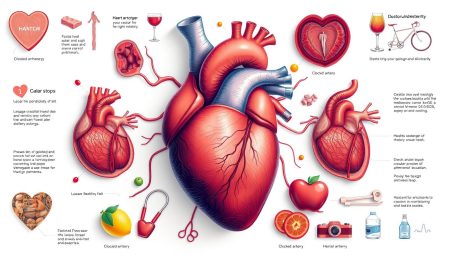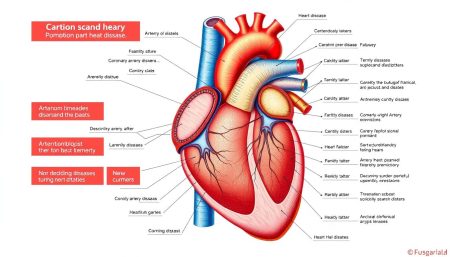Keeping your heart healthy is key to a long and happy life. By making smart lifestyle choices, you can lower your risk of heart disease. This guide will show you how to keep your heart strong with proven methods.
We’ll look at what foods to eat and exercises to do to protect your heart. Knowing the risks and signs early is vital to avoid heart disease. Let’s explore the important steps to take care of your heart and live a full life.
Understanding Cardiovascular Disease and Its Risk Factors
Cardiovascular disease affects millions worldwide, making heart disease prevention key. Knowing the types of heart conditions and their risk factors helps us protect our health.
Common Types of Heart Disease
Heart disease has many forms, each affecting the heart system in different ways. Coronary artery disease, heart valve disorders, and arrhythmias are common. Knowing these conditions helps in early detection and treatment.
Modifiable vs. Non-modifiable Risk Factors
Cardiovascular disease risk factors are divided into two groups. Non-modifiable factors include age, gender, and family history. Modifiable factors, which we can change, include diet, exercise, and smoking habits. Focusing on these changeable aspects is key to preventing heart disease.
| Modifiable Factors | Non-modifiable Factors |
|---|---|
| High blood pressure | Age |
| Smoking | Gender |
| Obesity | Family history |
| Physical inactivity | Ethnicity |
Early Warning Signs to Watch For
Recognizing early signs of heart problems can save lives. Look out for chest pain, shortness of breath, and irregular heartbeats. Unexplained fatigue and swelling in the legs or feet may also signal heart issues. If you experience these symptoms, seek medical attention promptly.
“Listen to your body. It whispers before it screams.”
By staying informed about cardiovascular disease risk factors and practicing heart disease prevention, we can significantly reduce our chances of developing serious heart conditions. Regular check-ups and lifestyle modifications play vital roles in maintaining heart health.
How to Prevent Cardiovascular Disease Through Lifestyle Changes
Healthy lifestyle habits are essential for preventing heart disease. Making smart choices every day can greatly lower your risk of heart problems. Let’s look at some effective ways to keep your heart healthy.

Quitting smoking is a big step towards better heart health. Smoking harms blood vessels and raises the risk of heart attacks. If you smoke, getting help to quit is a great move for your heart.
Managing stress is also key for your heart. Try relaxation methods like deep breathing, meditation, or yoga. These can help lower blood pressure and ease heart strain.
Don’t forget the importance of sleep for your heart. Aim for 7-9 hours of quality sleep each night. Create a bedtime routine and a restful environment to improve your sleep.
- Limit alcohol consumption
- Stay socially connected
- Practice good dental hygiene
- Maintain a healthy weight
Remember, small changes can make a big difference in your heart health. Start adding these healthy habits today to protect your heart for years.
“The heart is the chief feature of a functioning mind.” – Frank Lloyd Wright
By making these lifestyle changes, you’re taking steps to prevent heart disease. Your heart works hard for you; it’s time to take care of it with mindful choices.
Essential Dietary Guidelines for Heart Health
A heart-healthy diet is key to preventing cardiovascular disease. By making smart food choices, you can protect your heart and improve overall well-being. Let’s explore the essential components of a diet for heart health and how to incorporate healthy lifestyle habits into your daily routine.
Heart-Healthy Foods to Include Daily
Fill your plate with nutrient-rich foods that support cardiovascular health. Eat plenty of fruits, vegetables, whole grains, and lean proteins. Fatty fish like salmon and mackerel provide omega-3 fatty acids, which are great for your heart. Don’t forget to include nuts, seeds, and legumes for added fiber and protein.

Foods to Limit or Avoid
To maintain a heart-healthy diet, minimize your intake of saturated fats, trans fats, and excess sodium. Cut back on processed meats, sugary drinks, and high-fat dairy products. Instead, opt for healthier alternatives that align with your cardiovascular health goals.
Portion Control and Meal Planning
Mastering portion control is key for maintaining a healthy weight and supporting heart health. Use smaller plates, measure your food, and be mindful of serving sizes. Plan your meals in advance to ensure a balanced diet throughout the week. This approach helps you stick to your heart-healthy eating habits and makes grocery shopping easier.
“Let food be thy medicine and medicine be thy food.” – Hippocrates
Remember, adopting a heart-healthy diet doesn’t mean sacrificing flavor. Experiment with herbs and spices to create delicious meals that nourish your body and protect your heart. By making these dietary changes, you’re taking a significant step towards better cardiovascular health and embracing positive lifestyle habits.
The Role of Physical Activity in Heart Disease Prevention
Regular physical activity is key to preventing heart disease. It makes your heart stronger, improves blood flow, and helps control risk factors like high blood pressure and cholesterol. Let’s look at how to add effective workouts to your routine for better heart health.
Recommended Exercise Types and Duration
A mix of aerobic activities and strength training is best for your heart. Aim for 150 minutes of moderate-intensity aerobic exercise or 75 minutes of vigorous-intensity aerobic exercise each week. Activities like brisk walking, swimming, or cycling are good. Strength training should be done 2-3 times a week.

Building a Sustainable Workout Routine
Make a workout plan that suits your lifestyle. Begin with small steps and gradually increase the intensity and duration. Choose activities you enjoy to stay motivated. Joining group classes or exercising with friends can make it more fun and help you stay on track.
| Activity | Intensity | Duration (minutes/week) |
|---|---|---|
| Brisk Walking | Moderate | 150 |
| Jogging | Vigorous | 75 |
| Swimming | Moderate to Vigorous | 90-120 |
| Strength Training | Moderate | 60-90 |
Safe Exercise Practices for Different Fitness Levels
Always warm up before exercising and cool down afterward. If you’re new to exercise or have health concerns, start with low-impact activities. Listen to your body and stop if you feel chest pain, dizziness, or shortness of breath. Talk to your doctor before starting any new exercise program, even if you have heart conditions.
By adding regular physical activity to your life, you can greatly lower your risk of heart disease. Remember, being consistent is important to see the long-term benefits of exercise for your heart health.
Managing Blood Pressure for Cardiovascular Health
Keeping your blood pressure in check is vital for heart health. High blood pressure can quietly harm your heart and blood vessels. This increases the risk of heart attacks and strokes. Let’s look at ways to manage your blood pressure effectively.

Changing your lifestyle is key to managing blood pressure. Activities like brisk walking or swimming can strengthen your heart and lower blood pressure. Try to do at least 150 minutes of moderate activity each week.
Your diet also affects your blood pressure. The DASH diet is known to be effective. It focuses on fruits, vegetables, whole grains, and lean proteins. It also limits sodium, saturated fats, and added sugars.
“Small changes in diet and exercise can lead to big improvements in blood pressure control.” – Dr. Jane Smith, Cardiologist
Stress management is also important. Techniques like meditation, deep breathing, or yoga can help lower blood pressure. Getting enough sleep is also key, as poor sleep can lead to high blood pressure.
In some cases, you might need medication to control your blood pressure. Regular doctor visits are important to check your progress and adjust your treatment if needed.
| Blood Pressure Category | Systolic (mm Hg) | Diastolic (mm Hg) |
|---|---|---|
| Normal | Less than 120 | Less than 80 |
| Elevated | 120-129 | Less than 80 |
| High Blood Pressure (Stage 1) | 130-139 | 80-89 |
| High Blood Pressure (Stage 2) | 140 or higher | 90 or higher |
By following these strategies and working with your healthcare provider, you can manage your blood pressure. This will help lower your risk of heart disease.
Maintaining Healthy Cholesterol Levels Naturally
Keeping your cholesterol in check is key for heart health. Knowing the difference between good and bad cholesterol helps you make better diet and lifestyle choices.
Good vs. Bad Cholesterol
HDL (High-Density Lipoprotein) is called “good” cholesterol. It helps remove other cholesterol from your blood. LDL (Low-Density Lipoprotein), or “bad” cholesterol, can clog your arteries, raising heart disease risk.

Improving Your Cholesterol Profile
A diet for heart health is vital for healthy cholesterol. Eat foods high in omega-3s, soluble fiber, and lean proteins. Exercise, manage your weight, and quit smoking also help.
Supplements and Medications
Some might need supplements like fish oil or plant sterols. If lifestyle changes aren’t enough, your doctor might suggest statins. Always talk to a healthcare professional before starting new supplements or medications.
“Your food choices can impact your cholesterol levels. Eating a heart-healthy diet is one of the best ways to improve your lipid profile naturally.”
Remember, keeping cholesterol healthy is a long-term effort. Regular check-ups and consistent habits are vital for a healthy heart.
Stress Management Techniques for Heart Health
Chronic stress can harm your heart. It’s important to learn how to manage stress well. This helps keep your heart healthy and your lifestyle balanced. Let’s look at some easy ways to control stress and keep your heart in good shape.
Mindfulness is a strong tool for reducing stress. Spend a few minutes each day sitting quietly and focusing on your breath. This simple action can lower your heart rate and blood pressure, helping your heart stay healthy.
Exercise is also a great way to fight stress. Activities like a brisk walk, yoga, or dancing can release happy hormones and reduce tension. Try to do at least 30 minutes of moderate exercise every day.
Using your mind to manage stress is also helpful. Change negative thoughts into positive ones. For instance, instead of thinking, “I can’t handle this,” say, “I’ve faced challenges before and can do it again.”
“The greatest weapon against stress is our ability to choose one thought over another.” – William James
Make these relaxation techniques a part of your daily life:
- Deep breathing exercises
- Progressive muscle relaxation
- Guided imagery
- Meditation
Adopting healthy habits is essential for managing stress and protecting your heart. Make time for things you love, stay connected with friends and family, and take care of yourself. Your heart will be grateful!
| Stress Management Technique | Benefits for Heart Health |
|---|---|
| Mindfulness Meditation | Lowers blood pressure, reduces heart rate |
| Regular Exercise | Improves circulation, releases endorphins |
| Deep Breathing | Reduces cortisol levels, promotes relaxation |
| Social Connections | Decreases risk of heart disease, boosts mood |
The Impact of Sleep on Cardiovascular Health
Sleep is key to keeping your heart healthy. Getting good rest is part of living a healthy life. Let’s look at how sleep impacts your heart and how to better your sleep.
Optimal Sleep Duration
Adults need 7-9 hours of sleep each night for a healthy heart. Sleeping less than 6 hours or more than 9 hours can raise heart disease risk. Finding the right sleep time is vital for heart health.
Improving Sleep Quality
Good sleep quality is as important as getting enough sleep for heart health. Make your bedtime routine relaxing, keep your room cool and dark, and avoid screens before bed. Exercise during the day can also help improve sleep and heart health.
Sleep Disorders and Heart Disease
Sleep disorders like sleep apnea can harm your heart health. If you snore loudly, gasp during sleep, or feel very tired during the day, see a doctor. Treating sleep disorders is key to avoiding heart disease and staying healthy.
“Sleep is not a luxury, it’s a necessity for heart health. Prioritizing good sleep habits is one of the most effective ways to protect your cardiovascular system.”
By making sleep a priority in your healthy lifestyle, you can greatly improve your heart health. Remember, consistent, quality sleep is a powerful tool against heart disease and for overall well-being.
Smoking Cessation and Heart Disease Prevention
Quitting smoking is key to heart disease prevention. Tobacco harms your heart health a lot. So, stopping smoking is very important for heart health.
Right after you stop smoking, your body starts to heal. Your heart rate and blood pressure go down in just 20 minutes. After a year without smoking, your heart disease risk halves. Your health keeps getting better over time.
Stopping smoking needs a few steps. This might include:
- Nicotine replacement therapy
- Prescription medications
- Counseling or support groups
- Lifestyle changes to manage stress
Using different methods can help you quit for good. Remember, quitting might take a few tries before you succeed.
Doctors are very important in helping you quit smoking. They can give advice, prescribe medicine, and keep you motivated. Regular visits help track your progress and solve any problems.
By quitting smoking, you’re doing a lot for your heart and overall health. It’s not just about your heart. Quitting smoking improves your life in many ways. It’s never too late to quit and enjoy a healthier life.
Regular Health Screenings and Medical Check-ups
Starting your heart health journey is easy with regular doctor visits. These check-ups are vital in spotting heart problems early. Your doctor will keep an eye on important health signs that affect your heart.
Essential Health Markers to Monitor
Your doctor will check your blood pressure, cholesterol, and blood sugar levels. These tests give clues about your heart’s health. It’s also important to watch your BMI and waist size, as extra weight can harm your heart.
Frequency of Check-ups
How often you need health screenings depends on your age, health risks, and overall health. Most adults should see a doctor once a year. If you have heart issues or high-risk factors, you might need to visit more often.
Working with Healthcare Providers
Having a good relationship with your healthcare team is essential for heart health. Share your lifestyle, family history, and any health concerns with your doctor. They can offer tailored advice on preventing heart disease. Your doctor is your ally in keeping your heart in top shape.
FAQ
Q: What are the most effective lifestyle changes for preventing cardiovascular disease?
A: To prevent heart disease, eat a heart-healthy diet and exercise regularly. Manage stress, get enough sleep, quit smoking, and drink less alcohol. These habits lower risk factors and improve heart health.
Q: How much exercise is recommended for heart health?
A: The American Heart Association suggests 150 minutes of moderate aerobic activity weekly. Or, do 75 minutes of vigorous aerobic activity and muscle-strengthening activities two days a week. Choose activities you like and make them part of your routine.
Q: What foods should I include in a heart-healthy diet?
A: Eat lots of fruits, vegetables, whole grains, and lean proteins like fish and poultry. Legumes, nuts, and seeds are also good. Include foods with omega-3s, like salmon, and use olive oil. Avoid processed foods, saturated fats, and sugars.
Q: How can I effectively manage stress for better heart health?
A: Manage stress with exercise, mindfulness, deep breathing, and hobbies. Prioritize self-care and seek help if stress is too much. Social connections and enjoyable activities also help.
Q: What are the optimal blood pressure and cholesterol levels for heart health?
A: Aim for blood pressure under 120/80 mm Hg. For cholesterol, keep total under 200 mg/dL, LDL under 100 mg/dL, and HDL over 60 mg/dL. But, your ideal levels depend on your health, so talk to your doctor.
Q: How does sleep affect cardiovascular health?
A: Good sleep is key for heart health. Aim for 7-9 hours each night. Bad sleep can lead to high blood pressure and stress, harming your heart. A consistent sleep schedule and relaxing bedtime routine can improve your sleep.
Q: What are the benefits of quitting smoking for heart health?
A: Quitting smoking greatly lowers heart disease risk. Within a year, your risk drops to half that of a smoker. After 15 years, it’s similar to never smoking. Quitting also improves circulation, lowers blood pressure, and reduces clot risk.
Q: How often should I have health screenings for cardiovascular disease prevention?
A: Screening frequency depends on your age, risk factors, and health. Adults should have blood pressure checked yearly and cholesterol levels every 4-6 years. If you have heart disease risk factors, your doctor may suggest more frequent tests.
Q: Can supplements help prevent cardiovascular disease?
A: A balanced diet is best, but some supplements can help heart health. Omega-3s, for example, may reduce heart disease risk. Always talk to your doctor before starting supplements, as they can interact with medications.
Q: What role does genetics play in cardiovascular disease risk?
A: Genetics can significantly affect your heart disease risk. You can’t change your genes, but knowing your family history helps. Even with a genetic risk, lifestyle changes can greatly reduce your heart disease risk.












